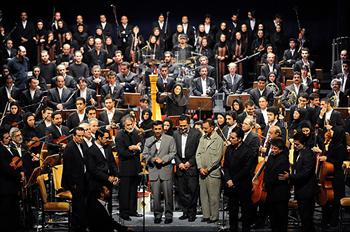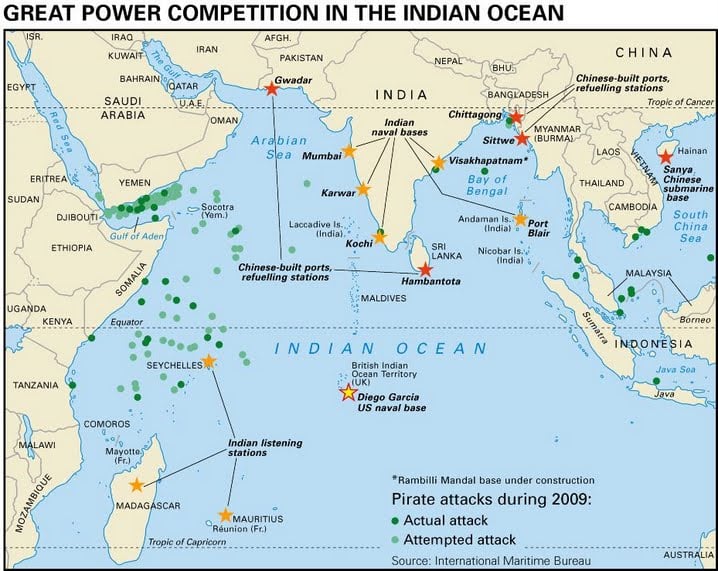GCHQ in the UK is recruiting for language specialists:
Arabic, Baluchi, Brahui, Chinese, Dari, Farsi, Pashto, Sorani and Somali.
Lots of info to report this week.
IOL and my own analysis:
---------------------
Washington is losing its leverage for negotiations with Iran. The closure of US prisons in Iraq means, they can't do any spy exchanges in the future. The threat of economic sanctions aren't going to work too well either -
Read NYT article for more details
Beyond that, China relies heavily on Iran’s vast energy reserves — perhaps 15 percent of the world’s natural gas deposits and a tenth of its oil — to offset its own shortages. The Chinese are estimated to have $120 billion committed to Iranian gas and oil projects, and China has been Iran’s biggest oil export market for the past five years. In return, Iran has loaded up on imported Chinese machine tools, factory equipment, locomotives and other heavy goods, building China into one of its largest trading partners.
However, the US is shaping up its Petrol sanctions policy: In early October the draft of an Iran Refined Petroleum Sanctions Act will be tabled before the U.S. House of Representative.
--------------------------
Obama doesn't like to have the Presidential Daily Briefing explained to him unlike GWBush. He just prefers to read it in the morning.
--------------------------
Fatah(The traitors) and Egypt are backing AQ affiliated jihadists to fight Hamas.
--------------------------
Prince Muqrin bin Abdulaziz has had his term as General Intelligence Directorate(GID) extended by 4 years by a royal decree early sept.
--------------------------
Western intel is working day and night trying to identify a potential successor to Iran's spirtual leader Ayatollah Ali Khamanei.
---------------------------
Riyadh has been thinking of paying off Hamas to pull the group away from Iran. But looks like GID is working on a different strategy across the ME. My ears are telling me that KSA intel is supporting the Christian Phalanges in lebanon.
------------------------
Sheikh Nasser bin Hamad (son of the King of Bahrain) is marrying the daughter of Sheikh Mohammed bin Rashid Al Maktoum of Dubai. The wedding is taking place tomorrow in Bahrain I am told.
------------------------
JPost article
'Hizbullah had better intel than Israel in 2006'
Hizbullah had better intelligence information than Israel and better control of its forces during the Second Lebanon War, according to an official IDF scorecard compiled recently by a top navy officer.
....
In intelligence, Hizbullah received a 7 and the IDF a 6; in military doctrine and strategy Hizbullah received a 9 and the IDF a 5; In technology, the IDF received a 9 and Hizbullah a 5; in training and organization, Hizbullah received a 8 and the IDF 7, and in tactical command Hizbullah received a 8 and the IDF a 6.
The 24 officers also ruled that Hizbullah had greater motivation to win than the IDF. Hizbullah received a score of 8 in the motivation category, while the IDF scored only 4.
------------------------
Folks, recently the UAE has secretly been kicking out all Lebanese shi'ites and Palestinians. Some are also facing harrassment from the UAE authorities. The expellees formed a committee and yesterday one of them made threats to UAE on a news channel.
----------------------
Al-Masri Al-Yawm (Egypt today paper which is controlled by Jamal Mubarak (son of Husni)) is "reporting" with front page coverage and a big headline that the Mossad dispatched a team to defeat Faruq Husni Mubarak at UNESCO
-------------------------
Palestinians join Israeli army for better life
Bedouin soldiers, for example, who are usually recruited as trackers, have to search for mines and booby-traps. Last year, a 28-year-old Bedouin man was blown up by a roadside bomb along the perimeter fence around Gaza as he went ahead of soldiers from the Givati brigade. Unlike Jewish soldiers killed in action, his family did not want his name published

Mahmoud Ahmadinejad singing with the Iranian orchestra.
Upon hearing of the death of "Lucy" from the "Lucy in the Sky with Diamonds" song, Mahmoud Ahmadinajad insisted on performing the song with a full Iranian Orchestra. (Asna)
-------------------------------------
Al Arabbiya aired a phone video clip on Al Qaeda funding, it proved that most of the funding for AQ still comes from KSA.
---------------------------
Nayef’s rise up the Al-Saud pecking order adds to the complexity of Saudi relations with the UAE
The elevation of Prince Nayef to second deputy premier has been closely observed in the UAE, where the veteran Saudi interior minister is regarded as being party to bilateral disputes since the foundation of the federation, writes Sultan Sooud Al-Qassemi*
Relations between Saudi Arabia and the United Arab Emirates have been strained in the six months since Saudi Interior Minister Prince Nayef Bin Abdelaziz was appointed second deputy premier, effectively catapulting him to become next in line to rule, while Crown Prince Sultan Bin Abdelaziz, who is 84, has been convalescing in the United States and Morocco (GSN 860/14, 858/1; 857/7). Many believe that due to his poor health and advanced age, Sultan is unlikely to succeed King Abdullah Bin Abdelaziz. If Nayef is next in line to the throne, the UAE has a dilemma because he has been party to most of the major bilateral diplomatic incidents for nearly four decades. Nayef, who is 76, has served in the Saudi Ministry of Interior (MoI) since 1970.
The first bilateral dispute arose when Nayef was deputy minister; it was settled when the young UAE federation signed a border agreement with Saudi Arabia in 1974. Saudi Arabia had laid claim to the oasis city of Al-Ain, some 500km inside the UAE. Although details of the agreement are still not fully known, it is believed the fledgling federation agreed to cede to Saudi Arabia parts of its Al-Udaid land borders with Qatar, a state that had also recently won independence from Britain.
Such a move might avoid tensions with the young country’s largest neighbour at a time when nation-building was founding president Sheikh Zayed Bin Sultan Al-Nahyan’s priority. But this dispute erupted again in 2005, when Nayef publicly opposed plans for a sea bridge that would link Abu Dhabi to Qatar, citing Saudi territorial claims to the region (GSN 761/1).
In May, Abu Dhabi withdrew from the Gulf Co-operation Council’s proposed monetary union after Riyadh was chosen as the administrative headquarters of the proposed Gulf central bank (GSN 854/1). UAE Foreign Minister Sheikh Abdullah Bin Zayed Al-Nahyan said: “The decision made by the GCC was not based on merit; it was based on different issues altogether.” The following month, Abu Dhabi newspaper The National published photographs of thousands of lorry drivers, many of whom were carrying fresh produce, stranded for a week in often appalling conditions in a 32km queue at the border with Saudi Arabia. According to Saudi Arabia, the dispute arose when the MoI introduced a new fingerprint-scanning system. Then, in August, it suspended the use of UAE ID cards for entry to the Kingdom, ostensibly because of the UAE map that appeared on them.
But the issue is not as simple as that. The accord that gave UAE and Saudi citizens reciprocal travel rights using an ID card was signed in May 2007. Three years before that, in May 2004, the new design of the $52m UAE ID card was approved by Interior Minister Sheikh Saif Bin Zayed and unveiled to the world along with the now contentious map. The accord included a 90-day notice period in the event that the measure was suspended, but according to an Emirati official, Riyadh gave them “less than two days before announcing the decision to the public”. The Saudi Press Agency also issued a strongly worded MoI statement that the Saudis had “warned the UAE”. This is a worrying precedent since such language has almost never been used between the GCC states. The UAE then put the Saudi government in an awkward position when it said it would continue to welcome Saudi citizens visiting the federation using Saudi ID cards.
In this difficult context, the UAE must draw up a strategy to deal with the various scenarios that could arise if Nayef becomes king. There is consensus that the future of both countries lies under the GCC umbrella, but the Gulf states must have options to deal with potential conflicts. There is concern that if Nayef succeeds to the throne, he may appoint to the government those from the MoI responsible for the deterioration of relations with the UAE.
The deep familial relations that tie the Saudis to the Emiratis will make sure that this dispute is contained. As the region’s largest, most populated and wealthiest state, big brother Saudi Arabia will remain first among equals in the GCC. But as in all family disputes, its younger siblings hope it deals with contentious issues discreetly. Until then, the UAE may have to hope for the best, but plan for the worst.
* Sultan Sooud Al-Qassemi is a non-resident fellow of the Dubai School of Government and a columnist for The National newspaper in Abu Dhabi.
---------------------
Boeing is thinking about buying back Kuwaiti F-18C/D's that they have been operating for almost 20 years and give the Kuwaiti's brand new F-18E/F's. The C/D's will be sold to Switzerland.
More later
